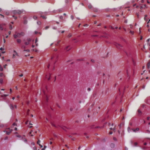Both systemic lupus erythematosus and lupus nephritis reduce a person’s life expectancy, with SLE cutting an average of 12.4 years off a person’s life expectancy and lupus nephritis reducing life expectancy by another 2.7 years, according to a study by Mok et al. Below, lupus expert Graciela S. Alarcón, MD, MPH, MACR, highlights some of the many abstracts on research into LN presented at ACR Convergence 2025. Also, review our collection of articles on the topic. Features are added often, so check back frequently.
FEATURED ARTICLE: Lupus Nephritis: A Serious Manifestation of Systemic Lupus Erythematosus









